I hope you enjoyed reading my last BookNotes post about how excited we were here at the shop about the brand new FRAMES books created by the Barna Group, and published by Zondervan.
hope you enjoyed reading my last BookNotes post about how excited we were here at the shop about the brand new FRAMES books created by the Barna Group, and published by Zondervan.
We have them all marked down from their regular retail price of $7.99 to $6.39 each.
As I explained, there are 9 of these mini-books (and a DVD coming in February) which combine up-to-date statistics and research about contemporary trends with top notch authors framing and reframing this data. The interplay of full-color charts and fun info-graphics with wonderful writing of faithful insight makes these pocket-sized books wonderful little tools for those wanting a new kind of quick-read, high-impact, book.
I want to tell you a bit more about each of them, but first a comment or two about the project.
In my last post I mentioned the Biblical call to (as Jesus Himself put it) understand the signs of the times, or (as I put it) the invitation for us to become “sons and daughters of Issachar” (I Chronicles 12:32) who “understood the times and knew what God’s people should do.” I suggested that it is part of the mission of Hearts & Minds, our Dallastown bookstore, to evoke different sorts of book buying and reading habits, encouraging folks to read more than only conventional devotional books, bit to read in ways that help us “think Christianly” about all of life and these particular times.
We use various terms to get at this, from “worldview studies” to “social engagement,” from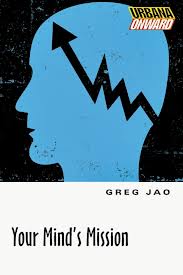 “developing the Christian mind” to “cultural transformation” and the like. We are glad that in recent years the term “missional” has become commonplace, and are thrilled that our bookstore is mentioned in Greg Jao’s little booklet Your Mind’s Mission (IVP; $5.00) which makes an argument for just this very thing: reading widely about the world to think faithfully in the world so we might live missionally for the world. I sometimes just shout out that we must “Read for the Kingdom!” If you are buying the FRAMES, maybe you should pick up one of these small booklets as well — we’re sort of proud of being a part of it.
“developing the Christian mind” to “cultural transformation” and the like. We are glad that in recent years the term “missional” has become commonplace, and are thrilled that our bookstore is mentioned in Greg Jao’s little booklet Your Mind’s Mission (IVP; $5.00) which makes an argument for just this very thing: reading widely about the world to think faithfully in the world so we might live missionally for the world. I sometimes just shout out that we must “Read for the Kingdom!” If you are buying the FRAMES, maybe you should pick up one of these small booklets as well — we’re sort of proud of being a part of it.
These just-released FRAMES mini-books help us do just this sort of culturally-engaged Kingdom reading, and they make it easy. You would have to spend quite a bit of dough to buy all the background papers from a research firm like The Barna Group that would enable you to understand the trends these books explore. It would take many hours of tedious searching to do the research yourself, even if you could find up-to-date, reliable data (not to mention the vexing questions of how to interpret the data, what to make of it, and how to respond to it.) David Kinnaman and his team at the research firm, The Barna Group are to be applauded for making this research available to us, presented so interestingly, at such low cost. So, there’s that: you can in a very short amount of time get “up to speed” on matters that are trending in our culture, and have a pleasant reading experience learning some facts about our place in these times, and the issues that are facing us as God’s people. The writers that then do the reflections on the data, and offer their proposals for how to frame and re-frame their given topic, are (as I’ve said) top-notch, experts or activists in their respective fields. The matching of the data about these trending concerns with wise and experienced leaders to guide us through it all is truly remarkable.
Secondly, in last week’s review I made a quip about the foolishness of their ad slogan “Read Less. Know More.” I want to underscore my frustration with this ludicrous phrase, but that does not in any way take away the value of these splendid little essays, or my personal pleasure in reading and recommending them. These are stellar and pleasurable pocket-rockets that will catapult you into new thinking about stuff that really matters. Their slogan should be “Read Just a Little and Know a Good Bit” but that just doesn’t cut it as a spiffy marketing campaign, now, does it? Where’s Don Draper when you need him?
Anyway, I know Mr. Kinnaman and most of the other FRAMES writers will continue to write long-form books which demand more conscientious reading habits than these slim volumes require. So, again, these are good ways to enter into the conversations that we need to be having about the “signs of the times” in our culture, and David has pulled together some very thoughtful leaders to help us consider these things. They are short, well done, and in some cases will be just about enough to bring you up to speed about the state of the matter. If you are a leader, I propose, along with the FRAMES team, that this is the least you can do — you need to know the lay of the land in our rapidly changing cultural context. There are a few starting questions to ponder in the beginning, and very good discussion questions in the “reframe” sections, too, so they are perfect little tools for small groups or planning teams, helping others learn about and imagine how we will respond to this trending data.
Although I already listed last time all of the titles in the FRAMES series, I wanted to offer a few of my own evaluations and reports about them.
Thanks to those who have already ordered the slip-cased boxed sets of them all (which saves quite a bit, actually — the boxed set sells usually for $59.99 but at our 20% off discount, they are just $47.99) and thanks to those who have pre-ordered the DVD. We will ship that out whenever it arrives, hopefully early February.
In the meantime, here’s the skinny on these handsome, skinny-minis. Again, they each sell for just $7.99, but we have them at 20% off. You can tell us which you want by clicking on the “order form” tab shown below. Thanks for caring.
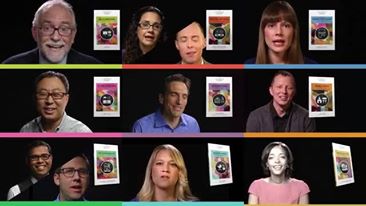
Wonder Woman: Navigating the Challenges of Motherhood, Career, and Identity Kate Harris,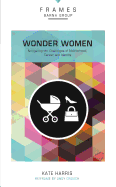 Re/Frame by Andy Crouch I think this is very, very good and while I do not mean to take away from the other excellent writers in this FRAMES series, I think it may be the best one of them all. Kate is a very good writer, eloquent and astute. She has been through a lot in life, and is yet a classy and insightful leader and mother of several children. She offers her organizational gifts as Director of Steve Garber’s nonprofit, The Washington Institute on Faith, Vocation, and Culture, and it is no criticism to say that Garber’s fingerprints can be seen on this: she quotes, as he does, authors from Simon Weil to Wendell Berry to Andi Ashcroft. She mentions novelists and tells stories about people she knows well. As a husband and father I absolutely resonated with her concerns about the need for a rich framework to help understand the different tugs and demands of our different callings, and her stories about finding refreshment amidst her busy schedule were very, very helpful. Andy Crouch does the “Re-Frame” piece at the end and it, too, offering a beautifully rendered description of his own family and the mystery and messiness of all human households. My, my, this is nice, and I think it an extraordinarily useful little volume, with stats about contemporary women, reflections about the nature of our stresses and vying vocations, and a framework for thinking freshly about it all. Very, very well done.
Re/Frame by Andy Crouch I think this is very, very good and while I do not mean to take away from the other excellent writers in this FRAMES series, I think it may be the best one of them all. Kate is a very good writer, eloquent and astute. She has been through a lot in life, and is yet a classy and insightful leader and mother of several children. She offers her organizational gifts as Director of Steve Garber’s nonprofit, The Washington Institute on Faith, Vocation, and Culture, and it is no criticism to say that Garber’s fingerprints can be seen on this: she quotes, as he does, authors from Simon Weil to Wendell Berry to Andi Ashcroft. She mentions novelists and tells stories about people she knows well. As a husband and father I absolutely resonated with her concerns about the need for a rich framework to help understand the different tugs and demands of our different callings, and her stories about finding refreshment amidst her busy schedule were very, very helpful. Andy Crouch does the “Re-Frame” piece at the end and it, too, offering a beautifully rendered description of his own family and the mystery and messiness of all human households. My, my, this is nice, and I think it an extraordinarily useful little volume, with stats about contemporary women, reflections about the nature of our stresses and vying vocations, and a framework for thinking freshly about it all. Very, very well done.
20 and Something: Have the Time of Your Life (And Figure It All Out, Too) David H. Kim,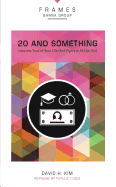 Re/Frame by Phyllis Tickle David is the Director of Redeemer Presbyterian’s Center for Faith and Work and a man I like and admire very, very much. Previously he worked in campus ministry (at Princeton University) bringing an “all of life redeemed” relevant worldview to the hungry 20-somethings there. Which is to say, he has a robust and big vision of orthodox faith and he knows well the realities on the ground, the real young people dealing with real issues as they emerge into adulthood in the 21st century. If you are a 20-something, some of the framing stats might surprise you (but most will not) but I am confident you will be encouraged by David’s essay to walk through this phase of life, in this complicated culture, with integrity and Christ-shaped joy. Hearing the voice of an feisty and creative octogenarian as renowned as Phyllis TIckle is fun, too, and her ecumenical insight is always worth reading. They reflect on the fact that most young adults do not have clear goals and offer (among other things) some good advice to help young adults be prepared for the future that comes after the “quarterlife.”
Re/Frame by Phyllis Tickle David is the Director of Redeemer Presbyterian’s Center for Faith and Work and a man I like and admire very, very much. Previously he worked in campus ministry (at Princeton University) bringing an “all of life redeemed” relevant worldview to the hungry 20-somethings there. Which is to say, he has a robust and big vision of orthodox faith and he knows well the realities on the ground, the real young people dealing with real issues as they emerge into adulthood in the 21st century. If you are a 20-something, some of the framing stats might surprise you (but most will not) but I am confident you will be encouraged by David’s essay to walk through this phase of life, in this complicated culture, with integrity and Christ-shaped joy. Hearing the voice of an feisty and creative octogenarian as renowned as Phyllis TIckle is fun, too, and her ecumenical insight is always worth reading. They reflect on the fact that most young adults do not have clear goals and offer (among other things) some good advice to help young adults be prepared for the future that comes after the “quarterlife.”
It seems to me, though, that this book documenting and reflecting up the data about young adults is not, finally, only for young adults. Parents, youth workers, preachers wanting to know their audiences, college professors (obviously, campus ministers or those who are involved in young adult ministry) simply must know this stuff. This little booklet could be used profitably in any church wanting to be a bit more aware of what 20-somethings are going through.
Greater Expectations: Succeed (And Stay Sane) in an On-Demand, All-Access, Always-On Ag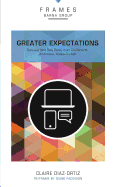 e Clair Diaz-Ortiz, Re/Frame by Diane Paddison Wow. Just wow. This describes much of my life and yours (I’ll bet) and if you struggle with issues of burn out — or fear burning out since you don’t quite know how to navigate the internal and external forces pressuring us to be “always on” then this is for you. 46% of Americans, this tells us, have expressed unhappiness with their work/life balance; the other info-graphics in this one were especially interesting to me, and the data is frightening. Authors from Lauren Winner to Matthew Sleeth to Eugene Peterson to Ruth Haley Barton and so many more have invited us to disengage from the hot-wired, always busy culture, to embrace rhythms of rest and sabbath, but it seems to me that some writings are unrealistic or they are a bit too complicit allowing us to “go with the flow” of desires and habits that are shaped by a story that is not the Story of God. Claire is a Silicon Valley innovator who was named as one of the 100 Most Creative People in Business by Fast Company. And she helps us be intentional about our response to the greater expectations within our culture and shows us briefly how to “reorder your days — and by extension, your life.”
e Clair Diaz-Ortiz, Re/Frame by Diane Paddison Wow. Just wow. This describes much of my life and yours (I’ll bet) and if you struggle with issues of burn out — or fear burning out since you don’t quite know how to navigate the internal and external forces pressuring us to be “always on” then this is for you. 46% of Americans, this tells us, have expressed unhappiness with their work/life balance; the other info-graphics in this one were especially interesting to me, and the data is frightening. Authors from Lauren Winner to Matthew Sleeth to Eugene Peterson to Ruth Haley Barton and so many more have invited us to disengage from the hot-wired, always busy culture, to embrace rhythms of rest and sabbath, but it seems to me that some writings are unrealistic or they are a bit too complicit allowing us to “go with the flow” of desires and habits that are shaped by a story that is not the Story of God. Claire is a Silicon Valley innovator who was named as one of the 100 Most Creative People in Business by Fast Company. And she helps us be intentional about our response to the greater expectations within our culture and shows us briefly how to “reorder your days — and by extension, your life.”
Schools in Crisis: They Need Your Help (Whether You Have Kids or Not) Nicole Baker Fulgham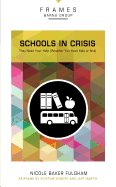 , Re/Frame by Kristine Somers & Jeff Martin I hope you remember that we’ve promoted the book by our friend Nicole Baker Fulgham, Educating All God’s Children. This does just what FRAMES can do — in a quick read you can be armed with all sorts of statistics about public schools, about the desires and hopes of parents, about citizen’s viewpoints, and the info-graphics here are stunning in their sweep and relevance. Educational inequity — linked to matters of race and poverty and so much more — is one of the biggest social problems of our time. Jonathan Kozol, known by many BookNotes readers, I’m sure, is not the only prophetic voice speaking out about the “savage inequalities” of our educational policies. Here, Nicole explains why churches should care about the common good, and how they can engage the local schools in their communities. This book is excellent, compelling, and not nearly enough. But it is perfect way to start the conversation, to get a foot in the door, to touch the conscience of you or your church friends. It will make you think and show you many things you and your congregation could do.
, Re/Frame by Kristine Somers & Jeff Martin I hope you remember that we’ve promoted the book by our friend Nicole Baker Fulgham, Educating All God’s Children. This does just what FRAMES can do — in a quick read you can be armed with all sorts of statistics about public schools, about the desires and hopes of parents, about citizen’s viewpoints, and the info-graphics here are stunning in their sweep and relevance. Educational inequity — linked to matters of race and poverty and so much more — is one of the biggest social problems of our time. Jonathan Kozol, known by many BookNotes readers, I’m sure, is not the only prophetic voice speaking out about the “savage inequalities” of our educational policies. Here, Nicole explains why churches should care about the common good, and how they can engage the local schools in their communities. This book is excellent, compelling, and not nearly enough. But it is perfect way to start the conversation, to get a foot in the door, to touch the conscience of you or your church friends. It will make you think and show you many things you and your congregation could do.
This great little book is for parents, mentors, friends, or anyone who cares about kids and wants them to succeed. Ms Fulgham is the founder and President of The Expectations Project, and the Re/Frame piece here is written by the producers of the important documentary Undivided. Somers and Martin work with BeUndivided, which can offer additional resources and help.
Sacred Roots: Why the Church Still Matters Jon Tyson, Re/Frame by Rich Villodas Tyson is a hip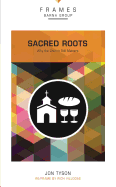 young church planter in Manhattan, and he is known for his trenchant cultural analysis and Biblically faithful ministry. He is a fascinating speaker and writer, too (how many pastors quote E. B. White and Noam Chomsky and Eusebius in the same message?) The stats offered here are important for all of us, I’d say, and while we all know the general sense that folks don’t attend church (or even value church) as they once did, it is illuminating to be brought up to speed on the most recent data. The “least churched” parts of the country maps are fascinating, as are the other bright infographics. The main “frame” piece by Tyson is absolutely excellent — I loved his wholistic vision and this multi-faceted discussion of the local body of Christ. I know a lot of good pastors who couldn’t make this clear of a case as to what church is and why it matters, so I think it would be good to pass this out to clergy folk you know. (They will thank you, I’m sure!) As with the other FRAMES, it is handsome and brief, ideal for a small group, or to give out to the those who are less than regular in church involvement. Why not buy a bunch of these and have them at the ready…
young church planter in Manhattan, and he is known for his trenchant cultural analysis and Biblically faithful ministry. He is a fascinating speaker and writer, too (how many pastors quote E. B. White and Noam Chomsky and Eusebius in the same message?) The stats offered here are important for all of us, I’d say, and while we all know the general sense that folks don’t attend church (or even value church) as they once did, it is illuminating to be brought up to speed on the most recent data. The “least churched” parts of the country maps are fascinating, as are the other bright infographics. The main “frame” piece by Tyson is absolutely excellent — I loved his wholistic vision and this multi-faceted discussion of the local body of Christ. I know a lot of good pastors who couldn’t make this clear of a case as to what church is and why it matters, so I think it would be good to pass this out to clergy folk you know. (They will thank you, I’m sure!) As with the other FRAMES, it is handsome and brief, ideal for a small group, or to give out to the those who are less than regular in church involvement. Why not buy a bunch of these and have them at the ready…
Hyper Linked: Live with Wisdom in an Age of Information Overload Jun Young & David 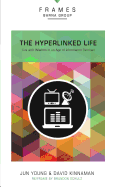 Kinnaman, Re/Frame by Brandon Schulz I have to admit I wasn’t going to study this one first, but I got drawn in, absolutely taken with it! I suspect I am not the only one who sees himself as a fairly mature, fairly well-adjusted, fairly thoughtful Christian leader who still — ugh! — struggles with dumb stuff like internet compulsions, digital temptations, falling into odd on-line conversation styles and other foibles from being on line too much. Why am I tempted to check my facebook one more time late at night? Why do I care how many people re-tweeted my latest post? Why don’t I just turn the thing off and go do something less virtual? Yep, let’s all face it, this new digital culture is demanding and is altering our lifestyles and attitudes and maybe even our neurology. Not enough people have read the important critics of technology, let alone digital technology, so this short piece is ideal, offering good data, colorful stories, and expert wisdom. The research shows that many are dissatisfied with their hyper-linked lives and the Barna Group has done us all a service by bringing some of their most salient data together into easy to grasp info-graphics with these moving essays alongside.
Kinnaman, Re/Frame by Brandon Schulz I have to admit I wasn’t going to study this one first, but I got drawn in, absolutely taken with it! I suspect I am not the only one who sees himself as a fairly mature, fairly well-adjusted, fairly thoughtful Christian leader who still — ugh! — struggles with dumb stuff like internet compulsions, digital temptations, falling into odd on-line conversation styles and other foibles from being on line too much. Why am I tempted to check my facebook one more time late at night? Why do I care how many people re-tweeted my latest post? Why don’t I just turn the thing off and go do something less virtual? Yep, let’s all face it, this new digital culture is demanding and is altering our lifestyles and attitudes and maybe even our neurology. Not enough people have read the important critics of technology, let alone digital technology, so this short piece is ideal, offering good data, colorful stories, and expert wisdom. The research shows that many are dissatisfied with their hyper-linked lives and the Barna Group has done us all a service by bringing some of their most salient data together into easy to grasp info-graphics with these moving essays alongside.
But here is something even more foundational going on with this excellent piece: 71% of the people surveyed admitted to being overwhelmed with informational overload. The phrase “info-glut” was coined years ago, and the breathtaking options of the interwebs have only deepened our crisis of epistemology: that is, what we know, how we know it, and how we know if we know it. Oh my, this is something that cuts to the very quick of our being human — what does it mean to know, how do we know, what do we care about, what do we do with what we know? How do we get information that we trust (and who do we trust as reliable?) What is the difference between knowledge and wisdom? In this important FRAMES, Jun Young (a communication specialist and founder of ZUM Communications) and David Kinnaman himself help us come to grips with this information crisis. They present, in a quick and readily understandably way, the contours of a “theology of information.” This is brilliant stuff, and in this quick little read, they offer insight I’ve hardly seen anywhere else put so succinctly and practically. Kudos to Barna for this vital research, for offering such a nice bit of solid insight to help us all figure out how to be more responsible in the information age.
Fighting for Peace: Your Role in a Culture Too Comfortable with Violence Carol Howard Merritt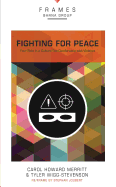 & Tyler Wiggs Stevenson, Re/Frame by Stephan Joubert You may know that in a previous era of my life I spent a lot of time doing anti-war work. I’ve done everything from protesting the manufacturing of nuclear weapons to lobbying about military funding to trying to get local convenience stores to quite carrying pornography that is inherently violent to women. I remain convinced that the gospel calls us to Christ-like peacemaking and that this includes not just being anti-war, but to embracing a nonviolent resistance to all manner of forces that degrade our neighbors and the whole of creation, even as we learn to be more gracious and civil in our families and neighborhoods. My sense is some might see this as controversial, and I myself often feel alone in this passion for reconciliation. Apparently, I am not as alone as I think I am, because the Barna Group has unearthed a lot of research data about American Christians concerns about violence. Nobody is happy about the crudity of our culture’s entertainment, and certainly no one relishes the thought of waging war. But yet, on we go — failing to adequately grapple with the violence embedded in so many aspects of contemporary culture. Kudos to Barna for offering this essential little reflection, an excellent thought-piece that we should all read and discuss. It is one of the most surprising and most passionate of all of them, and I hope it sells well. We commend it to you.
& Tyler Wiggs Stevenson, Re/Frame by Stephan Joubert You may know that in a previous era of my life I spent a lot of time doing anti-war work. I’ve done everything from protesting the manufacturing of nuclear weapons to lobbying about military funding to trying to get local convenience stores to quite carrying pornography that is inherently violent to women. I remain convinced that the gospel calls us to Christ-like peacemaking and that this includes not just being anti-war, but to embracing a nonviolent resistance to all manner of forces that degrade our neighbors and the whole of creation, even as we learn to be more gracious and civil in our families and neighborhoods. My sense is some might see this as controversial, and I myself often feel alone in this passion for reconciliation. Apparently, I am not as alone as I think I am, because the Barna Group has unearthed a lot of research data about American Christians concerns about violence. Nobody is happy about the crudity of our culture’s entertainment, and certainly no one relishes the thought of waging war. But yet, on we go — failing to adequately grapple with the violence embedded in so many aspects of contemporary culture. Kudos to Barna for offering this essential little reflection, an excellent thought-piece that we should all read and discuss. It is one of the most surprising and most passionate of all of them, and I hope it sells well. We commend it to you.
One of the good features of this good little book is that it has two authors — both acquaintances of mine, by the way — who focus on both the international scene and our domestic settings. Rev. Tyler Wiggs-Stevenson has done upstanding work in helping world leaders think about responsible disarmament and Rev. Carol Howard Merritt is a young, urban, Presbyterian pastor who has struggled against violence in the streets and homes of our nation’s capitol and, before that, in urban Chicago. What a story she has!) They both talk about matters such as war and gun violence, but also about what we watch on television and how we respond to family violence. I was very inspired by the documented trend that people of faith (even conservative evangelical faith) think we must consider the “things that make for peace” and very impressed with these two short pieces, loaded with good insight and good ideas.
May God bless this effort to deepen the dialogue, to not only appreciate the trending data, but to respond with Biblical faithfulness. The Re/Frame piece, by the way, is brief, but very compelling and includes a miraculous story from South Africa, one that I guarantee will make you grin and praise God. Don’t miss it.
Multi-Careering: Do Work That Matters At Every Stage of Your Journey Bob Goff, Re/Frame by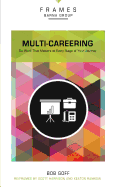 Scott Harrison & Keaton Rannow Just yesterday I watched some of the brand new 5-session Bob Goff Love Does DVD (also nicely published by Zondervan; $29.99) and (as if I needed reminded) remembered how much I love that guy. He “leaks Jesus” over everybody he meets with winsome, adventurous, faith and a way of leaning into life that is both exciting and even a bit scary. (Can I do that? Take chances by loving others, no matter what? Trust God as we live for others? Have fun by going on faith-filled capers?) Anyway, Goff wrote this one, and if you’ve read Love Does, I hardly have to say more. He tells some hilarious stories about his own failures in career options and how he works in a variety of venues. You want this, I know you do.
Scott Harrison & Keaton Rannow Just yesterday I watched some of the brand new 5-session Bob Goff Love Does DVD (also nicely published by Zondervan; $29.99) and (as if I needed reminded) remembered how much I love that guy. He “leaks Jesus” over everybody he meets with winsome, adventurous, faith and a way of leaning into life that is both exciting and even a bit scary. (Can I do that? Take chances by loving others, no matter what? Trust God as we live for others? Have fun by going on faith-filled capers?) Anyway, Goff wrote this one, and if you’ve read Love Does, I hardly have to say more. He tells some hilarious stories about his own failures in career options and how he works in a variety of venues. You want this, I know you do.
But don’t allow me to sell you on this merely based upon the whimsical reputation of the author. As with the other FRAMES this is serious stuff, responding to trends The Barna Group has uncovered in their sophisticated research. Did you know that three quarters of all adult Americans (75%) say they are “looking for ways to live a more meaningful life.” Wow. Let that sink in! David Kinnaman, in his important book You Lost Me, indicates that research shows that one of the reasons young adults leave the churches of their youth is because they perceive that Christian churches don’t seem to care about their work and have been unhelpful as they attempt to navigate the world of vocations and careers. This “Christian view of work” and forming meaning through visions of vocation isn’t just a little whim of us here at Hearts & Minds.
In this FRAMES they offer new data on this theme, how multi-careering is the “new normal.” Bob Goff gives us a new framework for thinking about calling and career along all the ages and stages of our lifetimes. Sometimes, he reminds us, this longing for great purpose and meaning and service may lead to finding a new vocation or job. Yet, “you won’t always find that work in the 8 to 5, which means you have to find it elsewhere. Sometimes following your calling means taking a risk, getting creative.” He advocates what some have called “a side hustle” or a passionate, missional avocation. Goff is a construction lawyer, himself, but also a human rights activist and philanthropist. He has worked with Young Life and he has founded Restore International, working for legal justice in Uganda and India.
The first of the two Re/Frame afterwords is by Scott Harrison, a former night club owner who started an amazing charity getting clean water to third world villages. It is a tremendous interview with him and is worth the price of the book for its inspirational vision and practical wisdom for anyone wanting to explore other avenues of Kingdom service. The other, by the way, is written by a 10-year old. I suspect Goff had something to do with that.
Becoming Home: Adoption, Foster Care, and Mentoring — Living Out God’s Heart for Orphan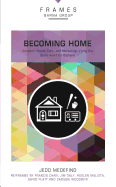 s Jedd Medefind, Re/Frame by Francis Chan, Jim Daly, Ruslan Maliuta, David Platt and Crissa Woodwyk Jedd Medefind is a mover and shaker, a young guy who has worked in the White House, who co-wrote a couple of excellent books. I respect him a lot, and admire his recent work founding the Christian Alliance for Orphans. He is perfect for this important little volume.
s Jedd Medefind, Re/Frame by Francis Chan, Jim Daly, Ruslan Maliuta, David Platt and Crissa Woodwyk Jedd Medefind is a mover and shaker, a young guy who has worked in the White House, who co-wrote a couple of excellent books. I respect him a lot, and admire his recent work founding the Christian Alliance for Orphans. He is perfect for this important little volume.
The statistics in this FRAME are fascinating and, for me at least, were very informative and even eye-opening. There are layers of complications around this data, indicating that many of us worry about inter-racial adoptions, about wounded children, attachment disorder, and so much more. There is interesting Barna Research indicating what many think about adoption, and who believes that we have responsibilities to involve ourselves as mentors to troubled youth. God’s call to care for the orphan surely has some consequence for all of us, and if you have wrestled about how to address the orphan crisis, this manifesto will help. Becoming Home is eloquent, packed for of good ideas, and has lots of moving stories, making it a lovely and useful book to read. It unpacks specific steps anyone could take to care for those in distress.
As it says on the back, “Some of these steps are “big” choices like fostering or adopting; some are simpler choices like supporting work abroad or mentoring a foster youth. But all are ways we can practically show love to orphans — not because of a sense of duty, guilt, or even idealism, but because we have first been loved by God.” Nice, eh?
Unlike most of the Barna FRAMES, this one has several short afterwords by several different perspectives on the adoption issue. These Re/Frames help remind us how important this is, and how to being to think about it faithfully. The discussion questions are very thought-provoking and would allow you to use this in any adult class, study group or Bible study.
DISCOUNT
ANY ITEM MENTIONED
20% off
order here
takes you to the secure Hearts & Minds order form page
just tell us what you want
inquire here
if you have questions or need more information
just ask us what you want to know
Hearts & Minds 234 East Main Street Dallastown, PA 17313 717-246-3333
read@heartsandmindsbooks.com
